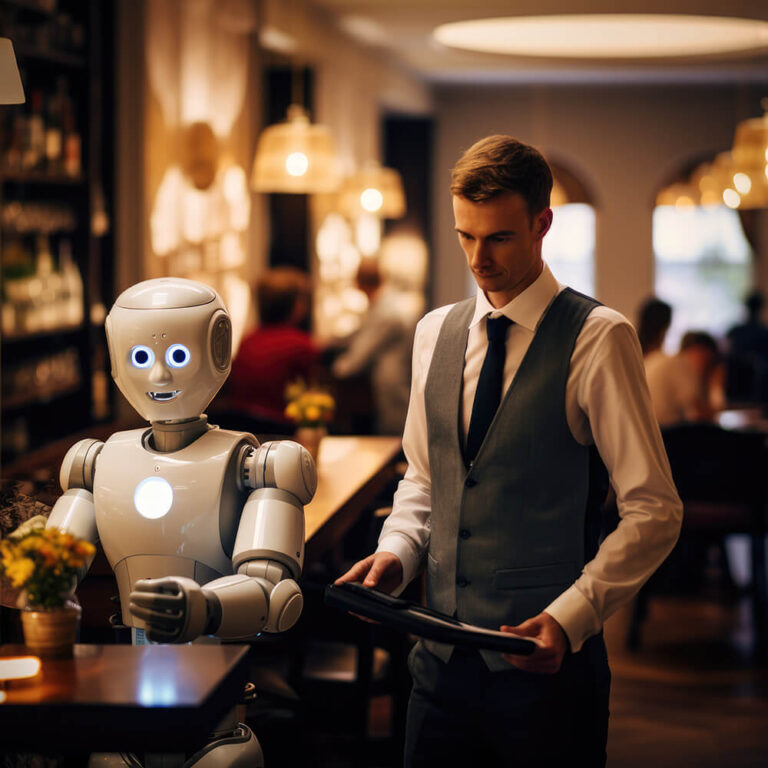Artificial Intelligence and the Future of Work: Opportunities and Challenges
隨著人工智慧(AI)技術的快速發展,全球職場正在經歷前所未有的轉型。自動化技術正逐步取代人類在某些領域的工作,從生產線上的機器人,到智能客服系統,AI 的應用正在影響各行各業,從製造業到服務業無一倖免。
As artificial intelligence (AI) technology rapidly advances, the global workforce is undergoing an unprecedented transformation. Automation is gradually replacing human jobs in certain areas, from robots on production lines to intelligent customer service systems. The application of AI is impacting various industries, leaving no sector untouched, from manufacturing to services.
然而,AI 的崛起並不僅僅意味著人類工作機會的減少。相反,它也為我們創造了許多新的機會。隨著數位化轉型的推進,許多公司正在尋求具備數位技能和對新技術有深入理解的員工。未來的職場將越來越依賴於具備數位素養的員工,這也促使員工需要不斷學習和技能提升。
However, the rise of AI does not merely imply a reduction in human job opportunities. On the contrary, it is also creating numerous new opportunities for us. As digital transformation progresses, many companies are seeking employees with digital skills and a deep understanding of new technologies. The workplace of the future will increasingly rely on employees who possess digital literacy, which, in turn, necessitates continuous learning and skill development.

當然,AI 也帶來了諸多挑戰。首先是職場轉型的速度可能會使一些員工難以適應。那些未能跟上技術變革的人可能會面臨失業的風險,尤其是在一些重複性工作上,這些工作最容易被 AI 所取代。此外,AI 的廣泛應用也引發了對工作保障和數據隱私的擔憂。
Of course, AI also brings numerous challenges. The rapid pace of workplace transformation may make it difficult for some employees to adapt. Those who are unable to keep up with technological changes may face the risk of unemployment, especially in repetitive tasks that are most easily replaced by AI. Moreover, the widespread adoption of AI has raised concerns about job security and data privacy.
為了應對這些挑戰,企業和政府需要共同努力,確保勞動力能夠適應新的技術需求。一方面,企業應該提供更多的職業培訓機會,幫助員工掌握未來所需的技能。另一方面,政府可以通過政策支持和教育改革來確保勞動力市場的健康發展。
To address these challenges, both businesses and governments need to work together to ensure that the workforce can adapt to new technological demands. On one hand, companies should provide more career training opportunities to help employees acquire the skills needed for the future. On the other hand, governments can support the healthy development of the labor market through policy support and educational reforms.
最後,我們不能忽視 AI 對未來工作的潛在影響。雖然自動化和 AI 可能會取代某些工作,但它們同時也會創造出全新的職位和行業。未來工作將更多地依賴於創造力、批判性思維和情感智能,這些都是 AI 無法輕易複製的能力。因此,未來的職場將成為人類和 AI 之間協同合作的場域,而不是一場零和遊戲。
Finally, we cannot ignore the potential impact of AI on the future of work. While automation and AI may replace certain jobs, they will also create entirely new positions and industries. Future work will increasingly rely on creativity, critical thinking, and emotional intelligence—abilities that AI cannot easily replicate. Therefore, the workplace of the future will be a space for collaboration between humans and AI, rather than a zero-sum game.
總結來說,AI 技術在改變工作方式的同時,也為我們帶來了新的機遇和挑戰。透過積極適應和持續學習,我們能夠在這個充滿變革的時代中把握機會,為未來的職場做好準備。
In summary, while AI technology is changing the way we work, it also presents us with new opportunities and challenges. By actively adapting and continuously learning, we can seize opportunities in this era of transformation and better prepare ourselves for the future workplace.


